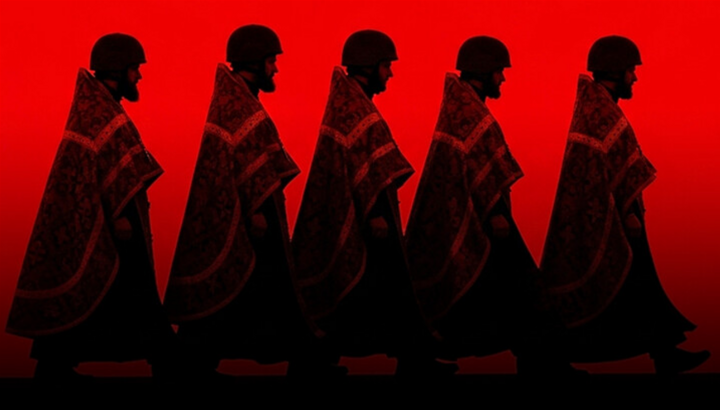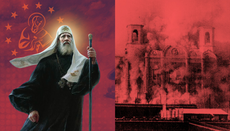All Priests to the Front: The Latest Tactic to Destroy the Church

As Ukrainian authorities intensify pressure on the canonical Ukrainian Orthodox Church, clergy are increasingly being conscripted. Legal options for deferral exist—but time is running out.
In a striking escalation of pressure against the Ukrainian Orthodox Church (UOC), authorities are reportedly pursuing a new strategy to suppress its clergy: drafting them en masse into the military. What once appeared to be isolated incidents has become a broader campaign, with priests now being routinely detained by military enlistment offices (TCC), processed rapidly, and sent to the front lines.
Confidential sources confirm that this is not accidental but rather a calculated policy to coerce the UOC into merging with the schismatic Orthodox Church of Ukraine (OCU). The clearest sign is the exclusion of UOC clergy from the official list of religious personnel eligible for military deferral.
The implicit message is clear: join the OCU, and your problems disappear—you'll be spared the front, stay with your family, and keep your monastery or parish life intact.
In a sense, this temptation is similar to the Gospel account: “Again, the devil took Him to a very high mountain and showed Him all the kingdoms of the world and their glory. And he said to Him, ‘All these I will give You, if You will fall down and worship me.’ Then Jesus said to him, ‘Be gone, Satan! For it is written, You shall worship the Lord your God and Him only shall you serve’” (Matt. 4:8–10).
For those who desire to follow Christ’s example and refuse to resolve their problems through an easy betrayal of the Church, the first response must be prayer and trust in the Lord’s mercy and all-good Providence: “Cast your burden on the Lord, and He will sustain you; He will never permit the righteous to be moved” (Ps. 54:23).
However, there are also practical actions one can take to avoid the fate the current Ukrainian authorities have prepared for our clergy.
Every priest must remember that his fate is the fate of the Church, the fate of the Christian community he shepherds. An ancient and universal principle still holds: “Strike the shepherd, and the sheep of the flock will be scattered…” (Matt. 26:31). Therefore, to prevent the flock from scattering, every priest should do everything within his power to remain with his faithful. The rest is in God's hands.
In fact, such efforts should have begun many months ago, rather than relying on the hope that the authorities would not dare to conscript priests into the army. For instance, those with two underage children could have had a third. Yes, children are a gift from God—not merely a way to avoid mobilization. But nonetheless…
In this article, we will speak plainly, driven by practical concern. If these recommendations prove helpful and allow even a few priests to remain with their communities, our goal will have been achieved.
Below are some legal ways by which priests can avoid conscription.
Legal Means of Avoiding Mobilization
Method 1: Disability Status
Any officially recognized disability—regardless of group—qualifies one for deferment under Article 23 of Ukraine’s Law "On Mobilization Preparation and Mobilization." Point 1 of this article states:
“The following are not subject to military service during mobilization: individuals who have been officially recognized as persons with disabilities, or who have been declared temporarily unfit for military service due to health reasons by a military medical commission for a term of 6–12 months (with a mandatory follow-up review).”
In practice, however, men with third-degree disabilities are still being drafted, which is illegal. Many clergy of mobilization age suffer from illnesses that would qualify them for a disability designation, but for various reasons have not pursued official documentation. This is a serious mistake. One should not wait until summoned by the enlistment office or expect the military commission to determine unfitness on its own. The disability status must be obtained beforehand and presented at the TCC.
While the process has become more complex due to healthcare reforms and bureaucratic delays, clergy who have legitimate grounds must push through and obtain the necessary documentation.
Method 2: Caregiving for a Disabled Person
Article 23 also outlines a list of individuals whose care entitles one to a deferment. These include:
- A wife with a Group I or II disability.
- A wife with a Group III disability under specific conditions (e.g., cancer, amputation, psychiatric illness, or the absence of paired organs).
- A wife, child, parent, or in-law requiring constant care due to illness (even without official disability status).
- A parent or in-law with Group I or II disability, when no other legally obligated caregiver is available.
Family members of the second (or third, if no second) degree of kinship caring for someone with a Group I or II disability.
To secure deferment, the caregiver must submit medical documentation proving the dependent’s condition, legal documents proving kinship, and an official certificate verifying the caregiving relationship.
However, the law does not provide deferment for clergy who care for ill parishioners unless they are legally recognized as guardians, which requires declaring the individual legally incapacitated—a long and burdensome legal process.
If a relative meets the conditions listed above and no one else is available to provide care, it is worth pursuing this legal route.
Method 3: Adoption, Guardianship, or Custodianship
If having a third biological child is not feasible, adoption is a legal alternative that grants deferment. Though the adoption process is complex and emotionally taxing, Article 23 also acknowledges guardians, custodians, foster parents, and caregivers as qualifying for deferment.
Deferment is granted to individuals who have assumed legal care for:
- A child with any disability under age 18.
- An adult child with Group I or II disability.
- A child with serious neurological damage, congenital disorders, cancer, cerebral palsy, diabetes (Type I insulin-dependent), kidney disease (Stage IV), or other grave conditions.
- A child previously orphaned or deprived of parental care, under age 18.
Taking custody of such a child is not only a lawful means to defer mobilization—it is a profoundly Christian act of mercy. Tragically, many such children exist in Ukraine today, awaiting care.
Method 4: Employment and “Booking”
The primary legal pathway to deferment is being “booked” by a critical enterprise. According to Article 23 and Cabinet of Ministers Resolution No. 76 (dated Jan. 27, 2023; most recently amended May 30, 2025), state bodies, local governments, and certain enterprises can reserve employees from mobilization.
For an enterprise to qualify, it must meet at least 3 out of 7 criteria:
- Strategic importance for national economy or security.
- Participation in mobilization tasks.
- Production in critical infrastructure sectors.
- Paid taxes of at least 1.5 million UAH in the previous year.
- Annual foreign currency income of at least 32 million UAH.
- Export volume of at least 3% of sectoral exports.
- At least 50 full-time employees.
If eligible, the enterprise submits a request to the relevant ministry (e.g., Energy, Agriculture), which forwards it to the Ministry of Economy. Once the enterprise is recognized as “critical,” it can nominate employees—up to 50% of its staff—for deferment, subject to approval by the Armed Forces General Staff.
A priest must be officially employed, receive a salary of no less than 20,000 UAH, and the enterprise must pay the corresponding taxes: 18% income tax and 5% military tax (~4,600 UAH total).
If a parishioner owns or manages such a business, they may be able to employ the priest in an official capacity—creating a position if needed—and facilitate the booking process. If the business is not yet recognized as “critical,” the community can assist in bringing it into compliance.
Postscript: A Call to Practical Action
These strategies are not step-by-step instructions but practical outlines for lawful action. Every method includes complex nuances best handled with the help of legal professionals.
While some clergy will be unable to benefit from these options and must entrust themselves entirely to the mercy of God, many among the UOC’s estimated 12,000 priests could secure deferments and remain with their communities. This would frustrate the authorities’ aim of dissolving the Church by removing its shepherds.
In the relationship between God and man, synergy is key. God governs the Church by His providence, but we must also do everything within our power to preserve and strengthen it.
Let us be clear: this is not a call for deceit. But using every lawful provision offered by the state to protect the Church and one’s priestly vocation is not only legitimate—it is necessary.









